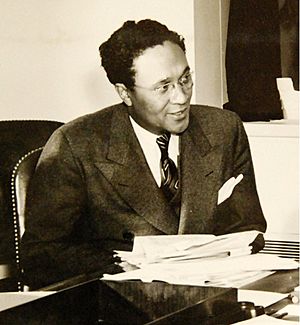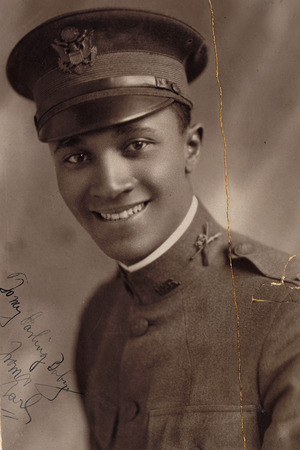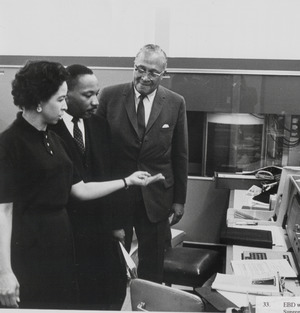Earl B. Dickerson facts for kids
Quick facts for kids
Earl B. Dickerson
|
|
|---|---|

Earl B. Dickerson while a member of the President's Committee on Fair Employment Practices
|
|
| Born | June 22, 1891 |
| Died | September 1, 1986 (aged 95) Chicago, Illinois
|
| Alma mater | University of Illinois University of Chicago Law School |
| Occupation | Attorney businessman |
| Political party | Democratic |
Earl B. Dickerson (1891–1986) was an important African American lawyer, community leader, and business executive. He is famous for winning a major case, Hansberry v. Lee, at the U.S. Supreme Court. This case helped fight against unfair housing rules. Dickerson spent his life working for civil rights and helping his community.
Contents
Early Life and Education
Earl Burrus Dickerson was born in Canton, Mississippi, on June 22, 1891. His family had a strong history of overcoming challenges. His grandfather, Benjamin Franklin Garrett Sr., bought his own freedom from slavery before the Civil War.
Earl moved to Chicago in 1907. He finished high school there in 1909. He then earned a bachelor's degree from the University of Illinois in 1914. While at college, he helped start the Beta chapter of the Kappa Alpha Psi fraternity. He was also its first president. Before getting his degree, he taught at the Tuskegee Institute for a year.
In 1915, Earl started studying law at the University of Chicago Law School. His studies were paused when he joined the U.S. Army during World War I. He became a second lieutenant in 1917 and served in France. After the war, he helped create the American Legion. He was the only Black founding member. He finished law school in 1920, becoming one of the first African Americans to graduate from the University of Chicago Law School.
A Career in Law and Business
In 1921, Dickerson became the main lawyer for the new Liberty Life Insurance Company of Illinois. This company later became Supreme Liberty Life Insurance Company. It grew to be the largest African American-owned insurance company in the North. Dickerson felt his work with this company was his most important contribution to society.
He also had his own law office. In 1923, he joined a law firm called Morris, Cashin, and Dickerson. He also worked as an assistant lawyer for the city of Chicago. Dickerson helped create Burr Oak Cemetery in 1927. This was one of the few cemeteries for African Americans in Cook County. During the Great Depression, he helped save the cemetery when it faced financial trouble.
Dickerson was known as a top Black lawyer in Chicago. In 1933, he became the first African American to be named Illinois Assistant Attorney General. He held this important role until 1939.
Fighting for Fair Housing: Hansberry v. Lee
One of Dickerson's most famous cases was Hansberry v. Lee at the U.S. Supreme Court. This case was about a house in Chicago bought by Carl Augustus Hansberry. The neighborhood had a "racially restrictive covenant." These were rules that stopped Black people from living in certain areas. This led to crowded, poor neighborhoods for Black residents.
Carl Hansberry was the father of the famous playwright Lorraine Hansberry. Her play, A Raisin in the Sun, was inspired by these events. Dickerson decided to argue the case based on a legal technicality, not just whether the rules were fair. This smart move helped them win. The decision in Hansberry v. Lee ended a restrictive covenant on the South Side of Chicago. It also helped pave the way for the Supreme Court to declare all such covenants illegal in 1948.
Leading Legal and Civil Rights Groups
Dickerson was a strong leader in many organizations. He joined the Cook County Bar Association in 1920 and became its president. He also worked to integrate the Chicago Bar Association, becoming a member in 1945. In 1945, he was elected president of the National Bar Association, which included most Black lawyers in the U.S. He also led the National Lawyers Guild from 1951 to 1954.
Dickerson was a dedicated civil rights activist. He joined the NAACP in 1920 and the Chicago Urban League in 1921. He served on the national board of the NAACP for 30 years. He was also president of the Chicago Urban League for many years.
He remained very involved with his fraternity, Kappa Alpha Psi. He helped organize its first alumni chapter. In 1924, he received the fraternity's highest award, the Laurel Wreath. He also served as the fraternity's national president.
In 1955, Dickerson became the president and CEO of Supreme Liberty Life Insurance. He held this top position until 1971.
Political Work and Achievements
In 1938, Dickerson created the South Side Legislative Commission. This group worked to propose new laws to the Illinois General Assembly.
In 1939, Dickerson was elected as the first Black Democratic alderman for Chicago's Second Ward. As an alderman, he worked to improve poor housing conditions for Black Americans. He also fought against unfair housing rules. He started the Second Ward Community Fund to help people in need get food and clothing.
President Franklin D. Roosevelt appointed Dickerson to the first Fair Employment Practices Committee (FEPC). Dickerson worked to improve job opportunities and conditions for Black Americans through this committee.
In 1963, Dickerson took part in the historic March on Washington for Jobs and Freedom. He stood near Martin Luther King Jr. during the "I Have a Dream" speech.
Dickerson received many honors for his work. He was one of the first people to get the Thurgood Marshall Award from the NAACP Legal Defense and Educational Fund. In 1971, he was named "Black Businessman of the Year." Chicago's Mayor Harold Washington even declared May 1, 1983, as "Earl B. Dickerson Day."
Personal Life
Earl Dickerson married Inez Moss in 1912, but they later divorced in 1927.
On June 15, 1930, he married Kathryn Kennedy Wilson. Kathryn had a son from a previous marriage, Rodger Wilson, Jr. Earl and Kathryn had one daughter together, Diane, who was born in 1934.
Earl B. Dickerson passed away at his Chicago home on September 1, 1986. He was buried next to his wife Kathryn in Burr Oak Cemetery, the same cemetery he helped establish.
 | Precious Adams |
 | Lauren Anderson |
 | Janet Collins |



